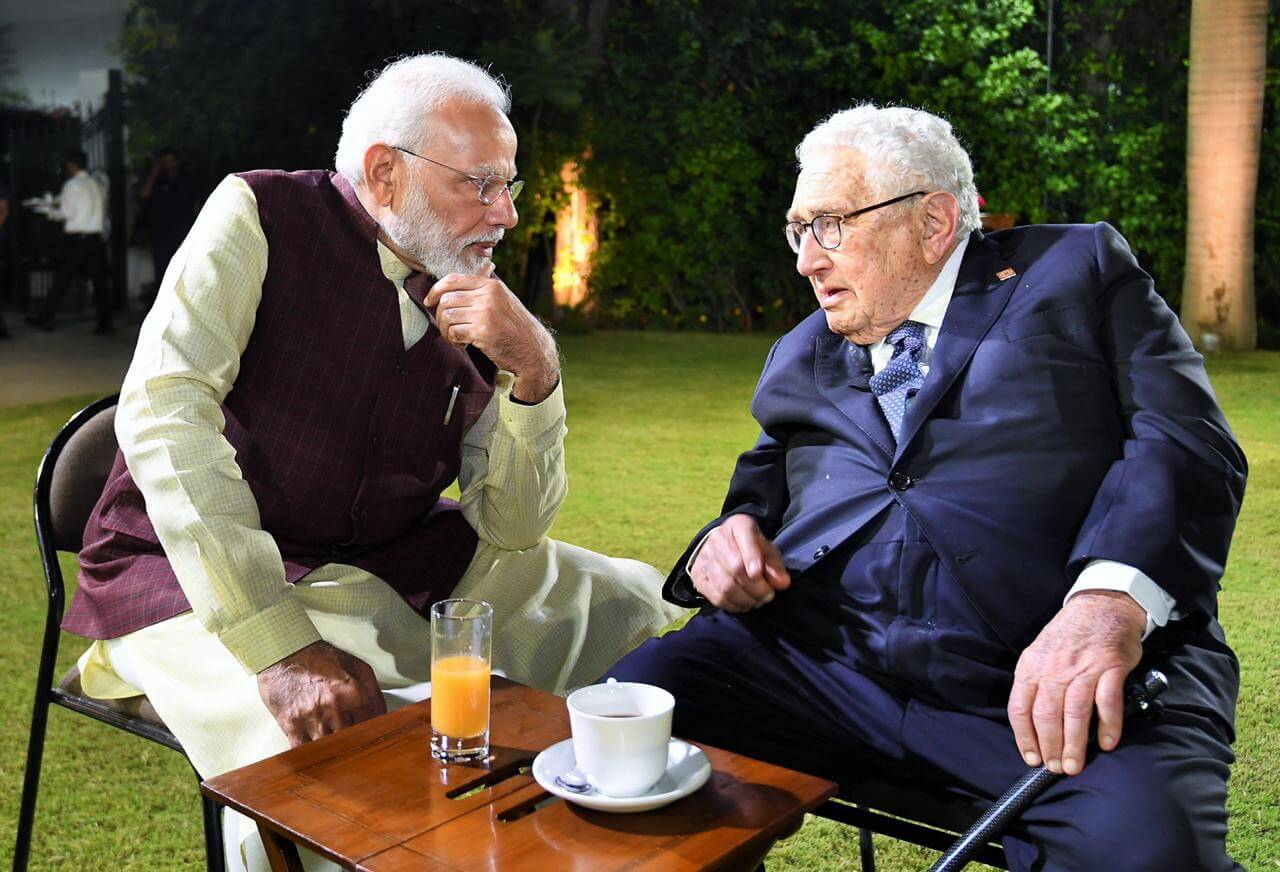Former US National Security Advisor (NSA) and Secretary of State Henry Kissinger died on Wednesday at his home in Connecticut at the age of 100, leaving behind a controversial legacy.
As the polarising Nobel Peace Prize winner, hailed as an influential statesman by some and decried as a ‘war criminal’ by others, has passed away, we look at his tumultuous relations with India.
Who was Kissinger?
The influential Jewish centenarian was born Heinz Alfred Kissinger on 27 May 1923 in Germany and fled to the US with his family in his teens.
A faculty at Harvard, Kissinger served as the NSA and Secretary of State under US Presidents Richard Nixon and Gerald Ford, shaping much of the ‘realist’ American foreign policy as it exists today.
Breaking news: Henry Kissinger dies at 100. The diplomat exercised an unparalleled control over U.S. international affairs and policymaking. He was also the target of relentless critics, who deemed him unprincipled and amoral. https://t.co/ApfqWfMuWM
— The Washington Post (@washingtonpost) November 30, 2023
Among his notable achievements were reaching an arms control treaty with the USSR, normalising US-China ties, and establishing “shuttle diplomacy” in the Middle East.
However, the realpolitik giant is abhorred for overseeing a secret four-year bombing of Cambodia and several other “crimes of commission” and “crimes of omission” across Latin America, Africa and Asia, which killed millions.
The geopolitical grand strategist’s controversial oversights also include his role in the Indo-Pak War of 1971.
India and Kissinger
Kissinger’s ties with India, especially with Indian PM Indira Gandhi, took a tumultuous turn during the Indo-Pak war of 1971.
Role in the Indo-Pak War, Aid to Pakistan
During the build-up to the war, Kissinger and then-US President Nixon followed an appeasement policy towards West Pakistan, allowing the country to carry out a ‘selective genocide’ that left half a million dead.
Declassified documents suggest that Kissinger sought to use Islamabad for its diplomatic openings to Beijing. Pakistan’s Yahya Khan was valuable to Nixon’s ambitions of restoring diplomatic relations with China.
Washington treasured Islamabad to serve as a counterbalance to India, which was seen as an ally to the Soviet Union. On US support to Pakistan, Nixon quoted Kissinger as saying, “We can’t allow a friend of ours and China’s to get screwed in a conflict with a friend of India’s.”
The American foreign policy under Kissinger allowed the illegal sale of arms to Pakistan via Iran and Jordan, violating a congressional embargo. These weapons were used in the brutal crackdown on the minority Bengali population. When Archer Blood, the American Consul General in Dhaka, called for intervention from Washington, there was a “deafening silence” with the US continuing to supply economic aid to Pakistan.
Disparaging Remarks About Indians and Indira Gandhi
When then-Indian PM Indira Gandhi travelled to Washington to talk about the situation, Nixon and Kissinger were not enthused. Documents reveal that Kissinger called Indians ‘b*st*rds’ and the ‘most aggressive people around.’ He accused PM Gandhi of ‘starting a war’ while calling her a ‘b*tch’ in a private conversation.
Kissinger was also the one to come up with the plan of sending a naval fleet to the Bay of Bengal to “scare off Indira.” On 10 December 1971, Task Force 74, including the nuclear aircraft carrier USS Enterprise, was asked to proceed to the Indian Ocean. The move was countered by the Soviets, who helped neutralise the US threat to India. Six days later, Pakistani forces unconditionally surrendered to India, bringing the war to a halt.
Much after the war, Kissinger described Indira as a person of “extraordinary character.” Attempting to do damage control, Kissinger expressed regret on his disrespectful remarks and urged that his foul language be seen in the context of the Cold War atmosphere.
Change in Views, Admiration for Indian Strategy
As Congress leader Jairam Ramesh mentioned, Kissinger positioned himself as a great friend and supporter of India for the last decade. Since the ascendancy of Indian PM Narendra Modi to power, Kissinger advocated stronger India-US ties. In June 2018, the global figure attended an event at the US-India Strategic and Partnership Forum (USISPF), where he said, “When I think about India, I admire their strategy.” In 2019, Kissinger visited India and met Modi.
Glad to have met Dr. Henry Kissinger. He has made pioneering contributions to international politics and diplomacy. pic.twitter.com/fhLFfi9i5U
— Narendra Modi (@narendramodi) October 22, 2019
In an interview with The Economist in May, Kissinger expressed high regard for how Indians conduct their foreign policy. He called Indian External Affairs Minister S. Jaishankar as a practising political leader close to his views.
In a break from his earlier racist remarks on Indians, where he disparaged Indians as ‘suck-ups,’ he appreciated Indians for having remarkable social tenacity in surviving thousands of years under foreign rule.
He mentioned that India and the US share common interests and vouched for India to strengthen its military with respect to China. In June this year, when Indian PM Narendra Modi visited the US for an official State visit, a wheelchair-bound Kissinger travelled to Washington to listen to Modi despite poor health.

